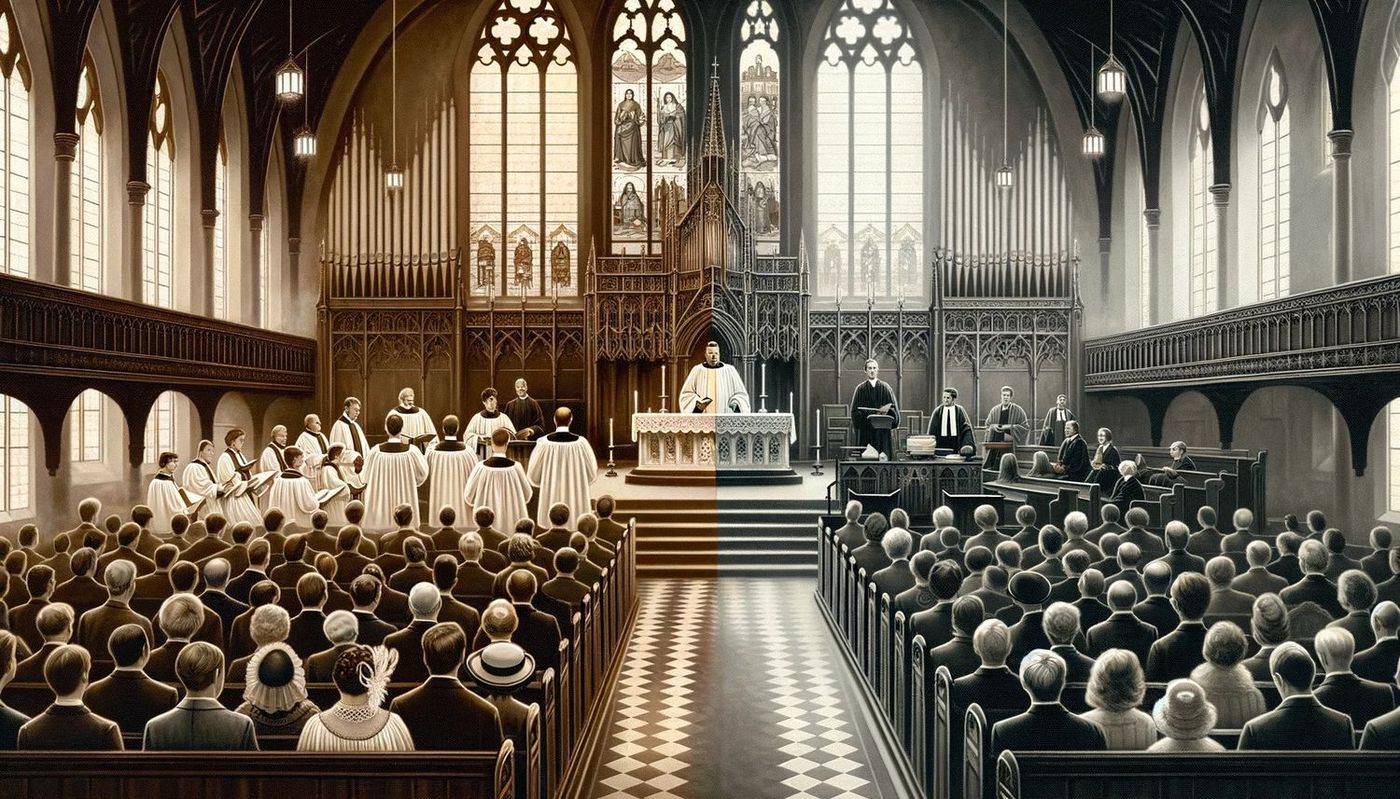Home>Theology and Spirituality>What Is The Difference Between Anglican And Baptist


Theology and Spirituality
What Is The Difference Between Anglican And Baptist
Published: February 22, 2024
Jason DeRose, Managing Editor at Christian.net, uses his expertise in religion and journalism to deepen understanding of faith's societal impacts. His editorial leadership, coupled with a strong academic background, enriches the platform’s diverse content, earning him recognition in both journalism and religious circles.
Discover the key distinctions between Anglican and Baptist beliefs, practices, and traditions in the realm of theology and spirituality. Explore the unique theological perspectives and spiritual approaches of these two Christian denominations.
(Many of the links in this article redirect to a specific reviewed product. Your purchase of these products through affiliate links helps to generate commission for Christian.net, at no extra cost. Learn more)
Table of Contents
Introduction
Anglicanism and Baptism are two prominent Christian denominations that have distinct histories, beliefs, and practices. Understanding the differences between these two traditions is essential for those seeking to explore the diverse landscape of Christianity. While both Anglicanism and Baptism share a foundation in the Christian faith, they diverge in significant ways, encompassing theological perspectives, church governance, and worship styles.
Exploring the nuances of Anglicanism and Baptism provides valuable insights into the rich tapestry of Christian traditions. This article delves into the historical origins, core beliefs, and distinctive practices of Anglicanism and Baptism, shedding light on the unique characteristics that define each tradition. By examining their differences in church structure, worship styles, and views on sacraments, readers will gain a deeper appreciation for the diverse expressions of Christian faith embodied by these two denominations.
History of Anglicanism
The history of Anglicanism is deeply intertwined with the complex tapestry of English religious and political developments. Its roots can be traced back to the 16th century when King Henry VIII's desire to annul his marriage to Catherine of Aragon led to a significant rift with the Roman Catholic Church. This schism ultimately led to the establishment of the Church of England as a separate entity from the authority of the Pope in Rome.
The reign of Henry VIII was a pivotal period in the formation of Anglicanism. In 1534, the Act of Supremacy declared the English monarch as the supreme head of the Church of England, marking a decisive break from papal authority. This move laid the groundwork for the emergence of a distinctively English form of Christianity, characterized by a blend of Catholic traditions and emerging Protestant influences.
The subsequent reign of Edward VI witnessed further reforms that aligned the Church of England with Protestant theology, emphasizing the primacy of scripture and introducing the Book of Common Prayer. However, the pendulum swung back towards Catholicism during the reign of Mary I, as she sought to restore Roman Catholicism as the official religion, leading to a period of religious turmoil and persecution.
The ascension of Elizabeth I to the throne heralded a new era for Anglicanism. Her reign brought stability and a definitive settlement that solidified the Church of England as a unique religious institution, distinct from both Roman Catholicism and radical Protestantism. The Elizabethan Religious Settlement of 1559 established the Church of England as a via media, or middle way, seeking to accommodate a broad spectrum of religious beliefs within its framework.
Throughout its history, Anglicanism has evolved in response to various social, political, and theological currents. The influence of the Oxford Movement in the 19th century sparked a renewed interest in the Catholic heritage of Anglicanism, leading to a resurgence of ritualism and a deeper appreciation for the sacramental life of the church. This movement contributed to the diverse theological landscape within Anglicanism, encompassing a broad spectrum of theological perspectives, from Anglo-Catholicism to evangelicalism and liberal theology.
The history of Anglicanism reflects a dynamic interplay of continuity and change, as the tradition continues to navigate its identity in a rapidly evolving world. Today, Anglicanism encompasses a global communion of churches, each with its own cultural expressions and theological emphases, reflecting the enduring legacy of a tradition shaped by centuries of historical, theological, and ecclesiastical developments.
History of Baptism
The history of the Baptist tradition is rooted in the 17th-century English Separatist movement, which sought to purify the Church of England from within. The early Baptists, influenced by the radical reformers of the Protestant Reformation, emphasized the primacy of believer's baptism and the autonomy of local congregations. This departure from infant baptism, practiced in the Anglican and Catholic traditions, marked a defining characteristic of the Baptist movement.
The early Baptists, often persecuted for their dissenting views, sought to establish communities of faith based on voluntary commitment and a believer's confession of faith. The emergence of Baptist congregations in England and the subsequent migration of dissenters to the American colonies contributed to the spread of Baptist beliefs and practices.
The Baptist tradition in America flourished in the context of religious pluralism and the principles of religious freedom enshrined in the First Amendment. The Baptist commitment to the separation of church and state, individual conscience, and the priesthood of all believers resonated with the democratic ethos of the new nation.
Throughout its history, the Baptist tradition has exhibited remarkable diversity, encompassing a spectrum of theological perspectives, worship styles, and ecclesial structures. From the conservative theology of the Southern Baptist Convention to the progressive ethos of the American Baptist Churches USA, the Baptist tradition reflects a dynamic interplay of continuity and adaptation to changing social and cultural landscapes.
The history of Baptism is characterized by a commitment to soul freedom, the authority of scripture, and the autonomy of the local church. This emphasis on individual conscience and congregational governance has shaped the distinctive identity of the Baptist tradition, fostering a legacy of resilience, diversity, and a steadfast commitment to the principles of religious liberty and social justice.
Today, Baptists continue to embody a rich tapestry of theological perspectives and social engagement, reflecting the enduring legacy of a tradition shaped by centuries of historical, theological, and ecclesiastical developments. The history of Baptism serves as a testament to the enduring vitality and adaptability of a tradition that continues to inspire and challenge the broader Christian community.
Beliefs and Practices of Anglicanism
Anglicanism encompasses a rich tapestry of beliefs and practices that reflect its historical development and theological diversity. At its core, Anglicanism is characterized by a commitment to both continuity with the early Christian church and a dynamic engagement with contemporary contexts. The following are key beliefs and practices that define Anglicanism:
Scripture, Tradition, and Reason
Anglicanism upholds the authority of scripture as the foundational source of Christian faith and practice. The Bible is revered as the inspired word of God and serves as a guide for belief and conduct. In addition to scripture, Anglicanism recognizes the importance of tradition and reason in interpreting the Christian faith. This threefold approach, often referred to as the "three-legged stool," acknowledges the interplay of scripture, tradition, and reason in shaping theological understanding and ethical discernment.
The Book of Common Prayer
Central to Anglican worship is the Book of Common Prayer, which embodies the liturgical heritage of the tradition. The Book of Common Prayer provides a framework for communal worship, encompassing a rich tapestry of prayers, liturgies, and rituals that reflect the sacramental life of the church. Its use underscores the Anglican commitment to a common worship tradition that transcends individual preferences and fosters a sense of unity and continuity across diverse cultural and theological contexts.
Sacramental Life
Anglicanism embraces the sacramental life of the church, affirming the importance of sacraments as visible signs of God's grace. The two central sacraments, baptism and the Eucharist (Holy Communion), occupy a central place in Anglican worship and spirituality. Baptism marks the initiation into the Christian community, while the Eucharist serves as a focal point of communal worship, embodying the presence of Christ in the sharing of bread and wine.
Episcopal Polity
The governance of the Anglican Communion is characterized by episcopal polity, which emphasizes the role of bishops as guardians of apostolic succession and spiritual overseers of the church. This hierarchical structure, encompassing bishops, priests, and deacons, reflects the historical continuity with the early Christian church and underscores the significance of ordained ministry in the life of the church.
The Via Media
Anglicanism is often described as the "via media," or middle way, seeking to navigate a course between Catholic and Protestant traditions. This theological stance reflects a commitment to inclusivity and theological diversity, accommodating a broad spectrum of beliefs and practices within the framework of the tradition.
In essence, the beliefs and practices of Anglicanism embody a dynamic tension between tradition and adaptation, continuity and change, fostering a tradition that is both rooted in historical heritage and responsive to the evolving needs of contemporary society. This nuanced interplay of beliefs and practices underscores the enduring vitality and adaptability of Anglicanism as a distinctive expression of the Christian faith.
Beliefs and Practices of Baptism
The Baptist tradition is characterized by a distinctive set of beliefs and practices that shape its identity and ethos. At the heart of Baptist theology is the emphasis on believer's baptism, which signifies a personal and voluntary commitment to the Christian faith. Unlike infant baptism practiced in many other Christian traditions, Baptists view baptism as an outward expression of an individual's inward confession of faith and personal relationship with God.
Believer's baptism is typically administered through full immersion in water, symbolizing the death and resurrection of Jesus Christ and the believer's identification with Christ's redemptive work. This act of immersion is seen as a powerful symbol of spiritual rebirth and the believer's incorporation into the community of faith. The practice of believer's baptism underscores the Baptist commitment to the priesthood of all believers and the autonomy of the local church in matters of faith and practice.
In addition to believer's baptism, the Baptist tradition places a strong emphasis on the authority of scripture and the autonomy of the local church. The Bible is revered as the inspired and authoritative word of God, serving as the ultimate guide for faith and conduct. This commitment to sola scriptura, or the primacy of scripture, underpins the theological convictions and ethical discernment of Baptists, shaping their beliefs and practices in diverse cultural and social contexts.
Furthermore, Baptists uphold the principle of congregational polity, affirming the self-governing nature of local churches and the democratic participation of members in decision-making processes. This congregational autonomy reflects the Baptist commitment to the priesthood of all believers and the freedom of conscience, fostering a sense of communal responsibility and accountability within the faith community.
Worship in Baptist congregations is characterized by a blend of traditional hymnody, fervent congregational singing, and expository preaching that emphasizes the authority of scripture and the proclamation of the gospel. The centrality of preaching and the active participation of the congregation in worship underscore the Baptist commitment to the priesthood of all believers and the communal discernment of God's will.
In essence, the beliefs and practices of Baptism embody a profound commitment to soul freedom, the authority of scripture, and the autonomy of the local church. This distinctive theological framework shapes the identity and ethos of the Baptist tradition, fostering a legacy of resilience, diversity, and a steadfast commitment to the principles of religious liberty and social justice.
Differences in Church Structure
The differences in church structure between Anglicanism and Baptism are rooted in their distinct approaches to ecclesiology and governance. These variances encompass the hierarchical arrangements, leadership roles, and decision-making processes within each tradition, reflecting their theological emphases and historical developments.
Anglicanism, characterized by its episcopal polity, is structured around a hierarchical system of governance led by bishops who oversee dioceses and exercise spiritual authority within the church. This episcopal structure traces its lineage to apostolic succession, emphasizing the continuity of ordained ministry from the early Christian church. The role of bishops as guardians of the faith and spiritual overseers underscores the significance of apostolic tradition and the sacramental life of the church within Anglicanism. Additionally, Anglican churches are often organized into provinces, reflecting regional and national ecclesiastical boundaries, with the Archbishop of Canterbury serving as a symbolic figurehead of the global Anglican Communion.
In contrast, the Baptist tradition embraces a congregational polity, emphasizing the autonomy of local churches and the democratic participation of members in decision-making processes. Each Baptist congregation operates independently, with its own governance structure and leadership, guided by the principles of soul freedom and the priesthood of all believers. This congregational autonomy fosters a sense of communal responsibility and accountability within the faith community, empowering members to actively engage in the discernment of God's will and the administration of church affairs. While Baptists may form associations or conventions for cooperative endeavors, the local church remains the primary locus of authority and decision-making in matters of faith and practice.
These divergent approaches to church structure reflect the theological convictions and ecclesiological priorities of Anglicanism and Baptism. While Anglicanism emphasizes historical continuity, episcopal oversight, and the sacramental life of the church, Baptism underscores congregational autonomy, the priesthood of all believers, and the democratic governance of local churches. These structural differences contribute to the distinct identities and organizational dynamics of Anglican and Baptist communities, shaping their ecclesiastical practices and relationships within the broader Christian landscape.
Differences in Worship Style
The differences in worship style between Anglicanism and Baptism reflect the diverse liturgical expressions and theological emphases that characterize these two Christian traditions. Worship in Anglicanism is deeply rooted in the rich tapestry of liturgical practices and sacramental rites, embodying a sense of reverence, continuity, and communal participation. Central to Anglican worship is the Book of Common Prayer, which provides a structured framework for communal prayer, scripture readings, and the celebration of the sacraments. The liturgical calendar, encompassing seasons such as Advent, Christmas, Lent, Easter, and Pentecost, shapes the rhythm of Anglican worship, inviting congregants to journey through the narrative of salvation history and the life of Christ. The use of ceremonial vestments, liturgical music, and ritual actions underscores the sacramental ethos of Anglican worship, fostering a sense of transcendence and sacred continuity with the historic Christian faith.
In contrast, worship in the Baptist tradition is characterized by a more spontaneous and participatory style, reflecting the emphasis on congregational autonomy, the priesthood of all believers, and the authority of scripture. Baptist worship typically features congregational singing of hymns and spiritual songs, expository preaching that emphasizes the proclamation of the gospel, and the observance of believer's baptism and the Lord's Supper as central acts of worship. The absence of a prescribed liturgy allows for flexibility and adaptability in Baptist worship, enabling congregations to engage in heartfelt expressions of prayer, praise, and responsive readings that resonate with the immediate spiritual needs and convictions of the faith community. The participatory nature of Baptist worship underscores the communal discernment of God's will and the priesthood of all believers, fostering a sense of shared responsibility and active engagement in the worship experience.
These differences in worship style reflect the distinct theological priorities and ecclesial dynamics of Anglicanism and Baptism. While Anglican worship emphasizes the sacramental and liturgical heritage of the tradition, fostering a sense of sacred continuity and reverence, Baptist worship embodies a more spontaneous and participatory ethos, reflecting the autonomy of local churches and the communal discernment of God's will. These contrasting worship styles contribute to the diverse expressions of Christian faith embodied by Anglican and Baptist communities, enriching the broader tapestry of Christian worship practices and spiritual experiences.
Views on Sacraments
The views on sacraments in Anglicanism and Baptism encapsulate the distinctive theological perspectives and liturgical practices that shape the spiritual life of these two Christian traditions. In Anglicanism, sacraments are regarded as visible signs of God's grace, conveying a profound sense of divine presence and transformative power within the context of communal worship and spiritual formation. The two central sacraments, baptism and the Eucharist (Holy Communion), occupy a central place in Anglican theology and spirituality, embodying the sacramental ethos of the tradition.
Baptism, as administered in Anglicanism, marks the initiation into the Christian community and signifies the incorporation of individuals into the body of Christ. It serves as a visible sign of regeneration and entry into the covenantal relationship with God, reflecting the sacramental understanding of God's redemptive work in the lives of believers. The sacrament of baptism underscores the communal dimension of faith and the nurturing of spiritual growth within the context of the worshipping community.
The Eucharist, or Holy Communion, holds a central place in Anglican worship and theology, embodying the real presence of Christ in the sharing of bread and wine. Anglicans affirm the sacramental nature of the Eucharist, viewing it as a sacred meal that conveys the spiritual nourishment and unity of the body of Christ. The Eucharistic celebration fosters a sense of sacred continuity with the historic Christian faith, inviting participants to partake in the mystery of Christ's presence and the communal fellowship of the faithful.
In contrast, the Baptist tradition emphasizes believer's baptism and the Lord's Supper as the two symbolic acts ordained by Christ. Baptism, as practiced in the Baptist tradition, signifies a personal and voluntary commitment to the Christian faith, reflecting the individual's confession of faith and spiritual rebirth. The act of immersion in water symbolizes the believer's identification with Christ's death and resurrection, embodying the transformative experience of salvation and the communal witness of faith.
The Lord's Supper, or communion, holds a central place in Baptist worship, signifying the commemoration of Christ's sacrificial death and the spiritual nourishment of believers. While Baptists do not adhere to the sacramental view of the Eucharist as conveying the real presence of Christ, they affirm the symbolic significance of the Lord's Supper as a memorial of Christ's redemptive work and a communal expression of faith.
These divergent views on sacraments reflect the theological nuances and liturgical practices that distinguish Anglicanism and Baptism. While Anglicanism embraces a sacramental theology that emphasizes the transformative power of visible signs in conveying God's grace, Baptism underscores the symbolic nature of believer's baptism and the Lord's Supper as acts of communal remembrance and spiritual nourishment. These contrasting perspectives contribute to the diverse expressions of Christian faith embodied by Anglican and Baptist communities, enriching the broader tapestry of Christian sacramental theology and spiritual experiences.
Conclusion
In conclusion, the exploration of Anglicanism and Baptism reveals the rich tapestry of Christian traditions, each embodying distinctive historical, theological, and ecclesial characteristics. The historical origins of Anglicanism, rooted in the complex interplay of English religious and political developments, have shaped a tradition characterized by a dynamic tension between Catholic heritage and Protestant influences. The commitment to scripture, tradition, and reason, the centrality of the Book of Common Prayer, and the sacramental life of the church underscore the enduring vitality and adaptability of Anglicanism as a unique expression of the Christian faith.
Conversely, the Baptist tradition, emerging from the 17th-century English Separatist movement, reflects a commitment to believer's baptism, congregational autonomy, and the authority of scripture. The emphasis on soul freedom, the priesthood of all believers, and the democratic governance of local churches has fostered a legacy of resilience, diversity, and a steadfast commitment to the principles of religious liberty and social justice within the Baptist community.
The differences in church structure, worship style, and views on sacraments between Anglicanism and Baptism highlight the diverse expressions of Christian faith embodied by these two traditions. While Anglicanism embraces episcopal polity, sacramental worship, and a sacramental theology that emphasizes the transformative power of visible signs, Baptism upholds congregational autonomy, participatory worship, and a symbolic view of believer's baptism and the Lord's Supper as acts of communal remembrance and spiritual nourishment.
Ultimately, the exploration of Anglicanism and Baptism serves as a testament to the enduring vitality and adaptability of Christian traditions, each contributing to the diverse tapestry of global Christianity. The theological nuances, ecclesial dynamics, and liturgical practices of Anglicanism and Baptism enrich the broader landscape of Christian faith, fostering a deeper appreciation for the multifaceted expressions of Christian spirituality and communal life. As we continue to navigate the complex terrain of religious diversity, the distinct identities and theological emphases of Anglicanism and Baptism offer valuable insights into the enduring legacy of Christian traditions and their profound impact on the spiritual journeys of believers across the world.












